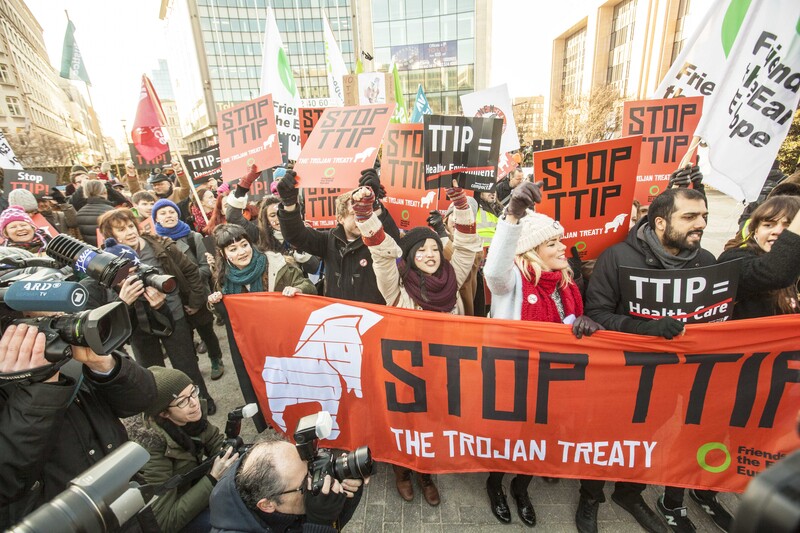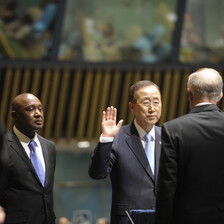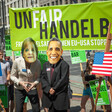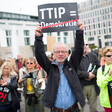The Electronic Intifada 19 February 2015

There is a massive opposition to TTIP across the whole of Europe. (Friends of the Earth Europe)
Two members of the US Congress have introduced a bill that would turn a giant trade deal between the EU and US into a devastating weapon against the people of Palestine and all those seeking justice alongside them. Together with the proposed Transatlantic Trade and Investment Partnership (TTIP) that is currently under negotiation, the proposed bill would compel all 28 EU member states to crack down on European groups participating in the growing movement of boycott, divestment and sanctions (BDS) against Israel in solidarity with the Palestinian people.
In order to combat the increasing isolation of Israel in global public opinion, European governments would effectively be turned into police agents for the US state.
The proposed US-Israel Trade and Commercial Enhancement Act presented to Congress on 10 February seeks to make any trade deal with Brussels conditional on the EU’s willingness to stop European governments, organizations or individuals engaging in BDS actions designed to hold Israel accountable for its responsibilities under international law.
The bill is explicitly framed as an attack on the BDS movement, a grassroots global movement responding to the 2005 call from Palestinian civil society asking people of conscience around the world to launch boycotts, divest from and impose sanctions on Israel until it recognizes Palestinian rights in full compliance with international law. The BDS movement has grown enormously since it was first launched, winning endorsement from trade unions and churches, causing multinationals such as G4S and Veolia to lose many contracts with public authorities around the world because of their involvement in Israeli projects that violate Palestinian human rights, and persuading major banks and pension funds to divest.
Extending repression
With its increasing successes, the BDS movement has been subject to an array of legal and political attacks, particularly in the US, Australia and in Israel itself. The new bill now before Congress is an attempt to extend this political repression deep into Europe too, using the TTIP negotiations as a vehicle.
Yet the EU-US negotiations are already highly controversial in Europe, where TTIP is widely regarded as a bid to give corporations an unprecedented level of power. News that the deal will also prohibit BDS campaigns in solidarity with the Palestinian people will add to the conviction that the US wants to use TTIP to undermine European democracy for its own geostrategic and economic purposes.
The TTIP negotiations were launched in summer 2013, and officials still hope to conclude a deal before the end of Barack Obama’s presidency.
TTIP is not a traditional trade agreement aimed at reducing border tariffs, since these are already at minimal levels between the EU and US. Instead, TTIP is focused on dismantling the “barriers” to trade that exist behind the border, namely the social standards, labor rights and environmental regulations that prevent transnational corporations from maximizing their profits when they trade or invest across the Atlantic.
Affront to democracy
In an additional affront to democracy, TTIP would introduce new powers for foreign corporations to bypass domestic courts and sue governments for potential loss of profits, in a parallel judicial system available to them alone.
For these and many other reasons, there is a massive movement of opposition to TTIP across the whole of Europe, and increasingly in the US. Environmental activists have made common cause with trade unions, food safety campaigners, anti-fracking activists and digital rights groups to oppose the deal, and there are now national No TTIP platforms coordinating actions at every level.
Campaigners have called for a global day of action against TTIP and other free trade agreements on 18 April, with hundreds of thousands expected to take part. Officials promoting the deal have acknowledged that they are losing the public debate.
The bill was proposed by a pair of US Congressmen from the two dominant American political parties. In a statement, Peter Roskam (Republican) and Juan Vargas (Democrat) make no secret of the fact that the bill is designed to “counter the BDS movement against Israel and strengthen the US-Israel economic relationship.” They further state that the bill “will ensure that American free trade partners never engage in this harmful and illegitimate political protest against Israel, while also protecting US companies from foreign lawsuits targeting their associations with Israel.”
Beyond these two Congressmen, the bill was supported with a letter by Israel’s former ambassador to the US, Michael Oren.
Now an Israeli electoral candidate, Oren has dedicated a great deal of time in recent years to raging against the BDS movement. This follows a pattern of Israeli government officials teaming up with American pro-Israel organizations and registered lobby groups attempting to use legal and governmental tools to attack the BDS movement and muzzle critics of Israel’s apartheid policies.
These tactics have been less effective in Europe, hence the proposed bill’s attempts to extend this influence into the EU.
Green light for surveillance?
The bill calls for surveillance and information-gathering on “politically motivated acts of boycott, divestment from, and sanctions against Israel.” A report based on this surveillance would be delivered to Congress within the first six months after enacting the bill.
The content of this report is specified to include information on “decisions by foreign persons, including corporate entities and state-affiliated financial institutions, that limit or prohibit economic relations with Israel or persons doing business in Israel or in Israeli-controlled territories.”
Given the US’ track record of surveillance of its own citizens, as well as other people around the world, it is safe to assume that this is another way to “legalize” information-gathering for business and political strategy. If the bill was passed and the TTIP negotiations were concluded, this would give a green light to US surveillance of individual citizens, activist groups, charities, companies and even governments in Europe.
The bill specifies its targets as any person, organization or entity that prohibits or otherwise decides against “doing business with Israel, with Israeli entities, or in Israeli-controlled territories.” This grants immunity from legal prosecution or even investigation to all types of Israeli businesses, including those involved in the production and trade of arms used in war crimes against the civilian population in Gaza. It also lets the scores of businesses operating in Israel’s illegal settlements in the occupied West Bank to continue their operations not only unrestrained, but even immune from questioning or critique.
This would mean that governments, campaigning organizations and individuals in the US and Europe would be barred from investigating allegations of war crimes or firms active in Israel’s settlements.
The bill makes frequent mention of the Arab League boycott of Israel, and notes how the US has used previous trade treaties to undermine solidarity actions against Israel’s oppression of the Palestinian people. It is known that the US government used its free trade agreements with Egypt and Jordan to this end, granting exports from their industrial zones duty-free access to the US market on the strict condition that they include Israeli inputs.
The new bill boasts that the US used its free trade agreements with Bahrain and Oman to stop those countries participating in the Arab League boycott, and that the US government had also made Saudi Arabia’s membership of the World Trade Organization conditional upon it no longer enforcing some elements of the boycott.
The introduction of this new anti-BDS bill in the context of the TTIP negotiations is a clear statement that anyone entering into trade agreements with the US must expect to forfeit their right to express solidarity with the Palestinian people. The anti-BDS bill would break any last bonds of accountability between governments and their citizens, preventing citizens from holding their governments responsible for their policies at home and abroad.
The anti-BDS bill must be opposed in the strongest terms, just as TTIP must also be rejected outright.
Ryvka Barnard is senior campaigns officer and John Hilary is executive director of War on Want.




Comments
The uppity US Congress is
Permalink maggie replied on
The uppity US Congress is getting too big for its britches if it feels entitled to tell European countries how to conduct their foreign policy. I'm am laughing, as I am sure Europe will be, at this nonsense.
Maximizing profits
Permalink Crusty replied on
This bill is the creature of American Israel Public Affairs Committee (AIPAC), a lobbying group that supports Israel and has the power and money to affect the success of some individual candidates for Congress. AIPAC's power is slowly waning but some few congresspeople will still sign any bill AIPAC puts before them, including this nonsensical bill. My guess is that none of the people who have signed this bill expect it to become law and it will not.
Having said that, even AIPAC at its most powerful has nothing against the combined power of world-wide corporations to "prevent transnational [them]... from maximizing their profits when they trade or invest across the Atlantic.". Corporate law forbids them from engaging in any activity that does not maximize profits for the shareholders. Such activity includes considering unions, concerns about the environment, and certainly the economic well-being of Israel.
What is about the composition
Permalink Chris Reed replied on
What is about the composition of the student bodies in the California system that allows them to move forward on this issue, and how can it be replicated in US universities in the heartland?
It's not gonna stop me!
Permalink Brian Griffen replied on
They can introduce as many bills and Orwellian laws they want. It's not gonna stop people from having a conscious. So go ahead and see how that's gonna stop me from boycotting Israeli Goods.
HEGEMONIC US EMPIRE DECIDES FOR THE WORLD !!
Permalink Peter Loeb replied on
This is not unusual for the US Congress which assumes its sole right to
unilaterally legislate and decide for the entire world. When not the Congress,
the US Executive pursues this agenda.
An unlawyerly suggestion is that the US Supreme Court may (and ought to)
declare such a law unconsistutional. I do not believe the US Constitution
confers a right of Congress to decide international policy for the world. Ask
a lawyer if an appeal to the admittedly "conservative" (in the legal/judicial
sense) US Supreme Court is in order and for the appropriate road such
an appeal should take according to US law and precedent. [I am no
lawyer much less one expert in international law.]
The Congress does direct the Executive to pursue goals such as positions at
the UN etc. These actions do affect other nations. However, it remains that they
are actions for the US to make on behalf..of the US. The US can--and does--
affect issues involving other nations via its UN policies. It cannot decide for
Europe or Israel or China etc. These views should be discussed with persons
whose legal background is greater than my own.
Incidentally, this is a core UN issue as well. The US with its "coalitions" has
time and again flouted UN procedure and process. So far the UN response has been that the US and its "coalitions" can do what it wants, where it wants and
murdering whom it wishes separately from the UN. UN rhetoric has been
clothing to cover other US and "coalition" (non-UN) actions. Sometimes
they are shouted as eternal excuses for coups, violence etc. Other times
the very same agreements and treaties of the UN are never ever mentioned
such as with Israel (See report to ICC.)
----Peter Loeb, Boston, MA, USA
In New Zealand
Permalink Iain Cameron replied on
There were large demonstrations across New Zealand about PM John Keyes and his government here pushing through a similar agreement with America...TTPA. I am wondering if it contains a similar clause re BDS. Keyes is discounting it all as a fuss about nothing but the protesters are not buying it and want him to release the transcript of the deal which thus far he is refusing to do.